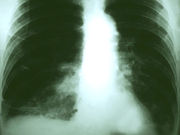For clinical stage 1 NSCLC, 21.7 percent of patients upstaged after 1 week; 31.5 percent after 8 weeks
TUESDAY, May 1, 2018 (HealthDay News) — For patients with non-small-cell lung cancer (NSCLC), significant upstaging can occur in each successive week from initial staging to surgery, according to a study presented at the annual meeting of the American Association for Thoracic Surgery, held from April 28 to May 1 in San Diego.
Derek Ray Serna-Gallegos, M.D., from the Cedars-Sinai Medical Center in Los Angeles, and colleagues obtained data for 52,406 patients with clinical stage 1 NSCLC undergoing surgical resection. The rates of upstaging were compared for stage 1 tumors based on the time from completed clinical staging to surgery for the first 12 weeks.
The researchers found that 25.4 percent of resections were performed within one week from the completion of clinical staging. By eight and 12 weeks, 78.9 and 91.2 percent of patients had undergone resection, respectively. Upstaging increased significantly with increasing week from completion of clinical staging to resection. For all clinical stage 1 NSCLC, there was a significant increase in upstaging, with 21.7 and 31.5 percent of patients upstaged after one and eight weeks, respectively. By the 12-week time period there was also a significant increase in upstaging (32.6 percent).
“An astonishing number of clinical stage 1 NSCLC patients upstaged to 3A disease at the time of surgery. Interestingly, a higher proportion of both clinical 1A and 1B patients upstaged to 3A versus 2B, suggesting a possible need for more aggressive mediastinal staging, even in early-staged patients,” a coauthor said in a statement. “Although current national guidelines recommend surgery within eight weeks from diagnosis, our study demonstrates there is a benefit in doing surgery even within a week to week basis.”
Copyright © 2018 HealthDay. All rights reserved.








